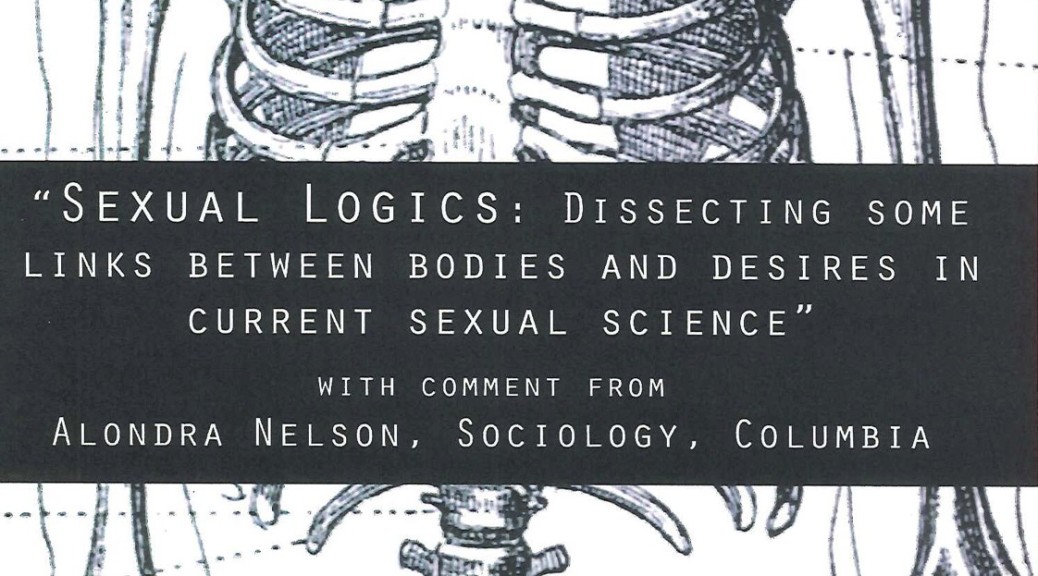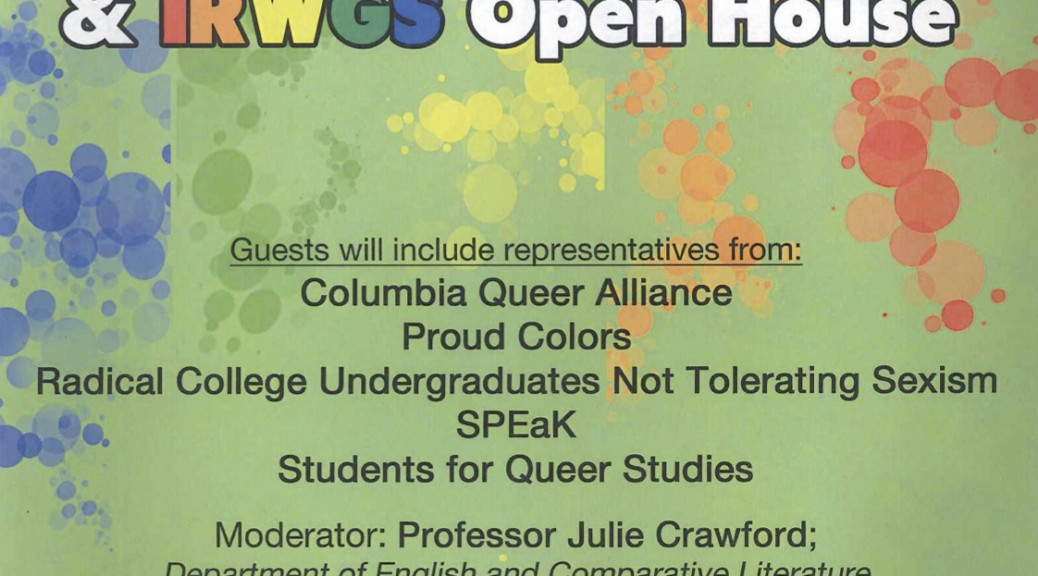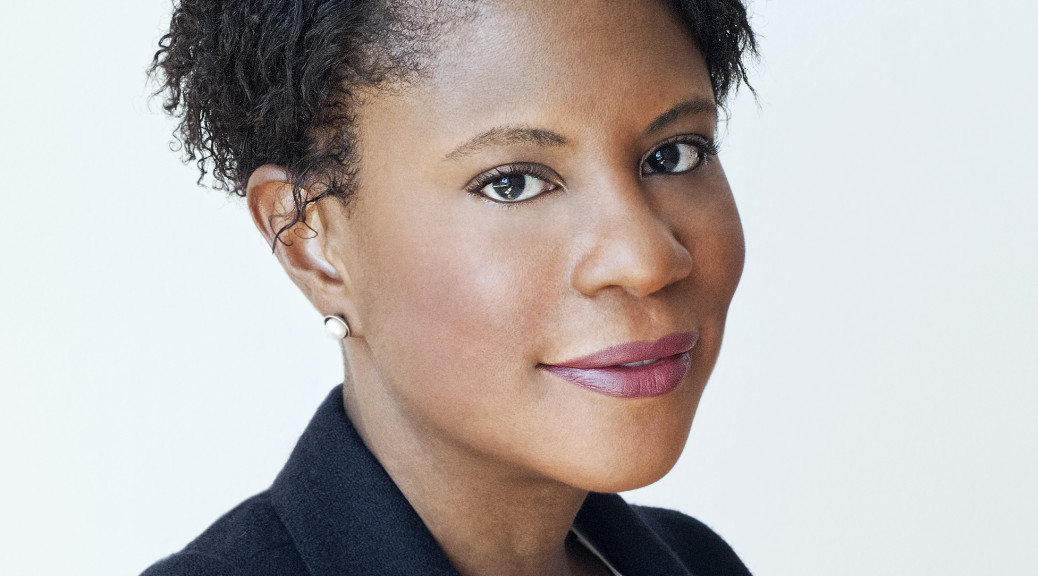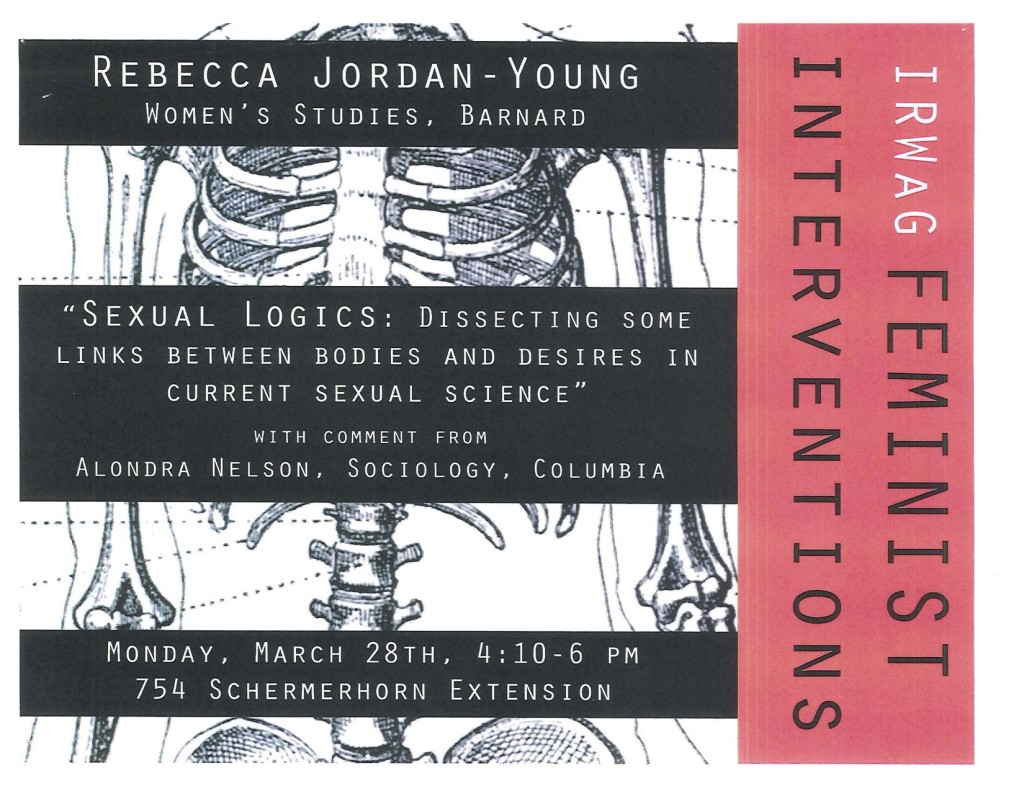
Category Archives: Alondra Nelson
LGBTQ Town Hall Meeting and IRWGS Open House
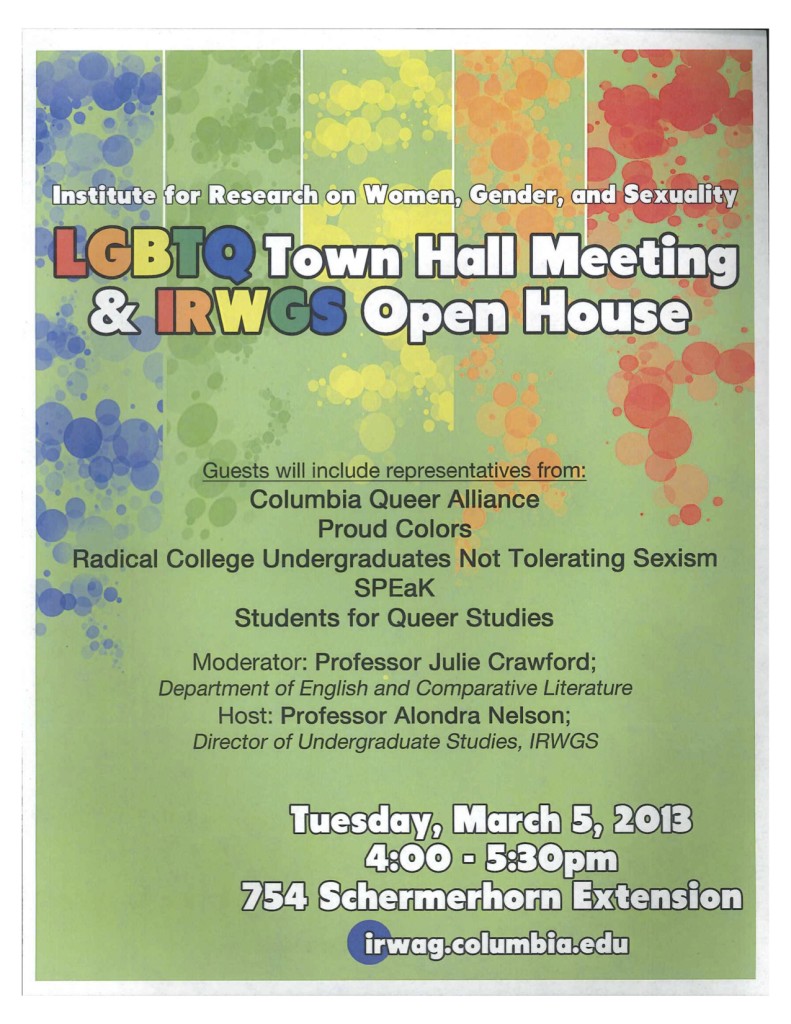
“Columbia comes to the institutionalization of women and gender studies late…”
ALONDRA NELSON
Dean of Social Science, Professor of Sociology and Gender Studies
IRWGS Core Faculty
IRWGS Director, 2013-14
One of the really interesting things about IRWAG as a women and gender studies program is that it starts late. It doesn’t start until [1987]. By this point, you’ve already had the high water mark of second wave feminism. It happens because Columbia goes co-educational and you have, on campus, people like Martha Howell, and people who have been here a very long time in the feminist trenches without any kind of institutional space, but on their own doing feminist pedagogy, on their own doing feminist mentoring on campus and these sorts of things. Columbia comes to the institutionalization of women and gender studies late, at least ten years later than many of the other programs. I think the first program—I was at San Diego State last year at some point—the first women and gender studies program starts—it would have been feminist studies or women studies actually—in 1972. San Diego State lays claim to being the first one. Columbia is more than a decade later. That means that this program looks differently.
I think one of the things that might have been difficult for students is all of our work, at first glance, doesn’t look like feminist and gender studies work. I work on genealogy and what’s called kin-keeping and root-seeking. For me, that’s very much about thinking about norms around the family. All of this stuff around genetic genealogy assumes a heteronormative, normative family. That critique and that engagement with that conversation is part in parcel of what I’m always doing. Saidiya Hartman’s last book was on root-seeking in Ghana. Jean Howard works on Shakespeare. Roz Morris has been running a series on Africa and South Africa.
For the faculty, we are feminists. Everything that we do, our intellectual work, is always imbued with that. An example I use all the time is that when I was in graduate school looking at dissertations from the ‘80s and early ‘90s, there would be dissertations on labor or citizenship, name a topic, and there would be a gender chapter. I remember talking to people, older graduate students or people who are assistant professors, and that was the strategy. You do a gender chapter. But I come of age as a graduate student, as an undergraduate, where I don’t know how to think without always having a gendered perspective and a feminist perspective. That antenna is always up and active. It’s not isolated to a chapter. This book on the Black Panther Party’s health activism, there’s not a gender chapter, but there’s gender throughout the book in, I think, a matter of fact way. It’s less about the objects, like you mentioned some people work near history, far history, text, not text. Marianne [Hirsch] has worked on the family, but she’s also been working on memory. So I think if students don’t understand that history and they’re looking for a women and gender studies program that everybody’s work, every title, everything is “Gender and this,” “Women and that,” “Sex and this,” we’re just a little bit different. Part of that is because we come late. Women and gender studies is institutionalized late at Columbia, so Columbia is able to chart a different path.
“IRWGS has been the place where you look for women leaders…”
ALONDRA NELSON
Dean of Social Science, Professor of Sociology and Gender Studies
IRWGS Core Faculty
IRWGS Director, 2013-14
At its beginning, IRWAG exists because of strong women leaders on campus. I think it’s been, not wanting to go too far with origin stories, but I think it’s no coincidence then that the women who then get hired into the lines—when the institute starts to have lines—are prominent, formidable scholars. It’s been the case in a lot of institutions, some peer institutions, some not, that women and gender and sexuality studies is the least well resourced. Often it’s scholars with low status relative to other scholars on campus, often the case that they’re spousal hires, so they’re trailing spouses—some great man of science or industry or history that they’re following—and they need a place to teach. That was never really the case at IRWAG, so you begin with, again, lots of very capable, very smart, very formidable women, for the most part, in its leadership. I think it’s not rocket science. If you are looking on campus, at a moment in the ‘90s and the ‘00s, to really do something about the fact that—in a not good way—leadership at Columbia has been mostly men. You can look at the deans of the colleges, the deans of the schools and all the higher administration. We have yet to have a woman president. We’ve yet to have a woman dean of the faculty in the Arts and Sciences.
IRWAG has been that place, for good and for naught, where you poach the women leaders. Not only people who are on the core faculty, but people who have more informal leadership roles. People like Julie Crawford, who was I think one of the chairs of the Committee on Instruction and is now running Lit Hum, she’s the director of the core curriculum program. Christia Mercer was running the [Lit Hum] before her, who’s a quarter appointment in IRWAG. Marianne [Hirsch] was doing professional service for the MLA. Jean [Howard] was the board of trustees at Brown. I mean, just on and on and on and on.
It’s tough. It’s mostly a bittersweet story. It’s mostly not a positive story about the institutional strain that IRWAG is put under. What’s been great is that I have a group of colleagues who are so committed to doing this work that, often to our detriment, we hold it together with great mentorship of graduate students and undergraduate students, exciting programming with a shoestring budget, and we still do it while having all these other leadership obligations. I mean, for a time Lila [Abu-Lughod] was directing both the Middle East Institute, I think, and the Center for the Study of Social Difference at the same time. I mean, wow. That’s a lot of work. Obviously the downsides are that that energy is siphoned off from the institute. Another way of saying that is if everybody’s energy was allowed to be focused on the institute, my goodness, what could it be? What campus juggernaut could we be dealing with here? It’s a profound compliment that this is the space in the arts and sciences, but I think that the institute is not always well compensated in the sense of restoring both that energy and, frankly, labor to the institute in turn.
“…I’m giving up a lot of what’s important to me to hopefully do this other kind of work…”
ALONDRA NELSON
Dean of Social Science, Professor of Sociology and Gender Studies
IRWGS Directors, 2013-14
We really wanted to both create a space for students so we, when I was director, allowed students to use the space for student groups, for meetings, anything that they wanted to do. We also started this, as part of the Queer Futures series, a series of explicit talks around lesbian and gay issues but issues around transgender in particular. There was just so much I wanted to do and to accomplish. When I met with David [Madigan] in December, when he offered the job to me—so it’s the second conversation. I first said to him, “Is it a fulltime job? Can I do that and still direct the institute?” He like jumped back and said, “I don’t think so. I don’t think anybody’s ever asked. Let me think about it. I’d have to ask,” but that was my first impulse was to really want to continue that work, because I loved doing that work. I felt like we were doing—it just felt special and we were getting better at outreach. We were really expanding the Twitter feed and the Facebook feed and bringing students into the space and having more students at events. When I first came to the institute, we sometimes had big, well-attended events, but that was not the norm. We would have events where you just had a couple of people and some crickets. I always thought that that was such a shame. Part of it was, one of the first things I did was to really schedule out for almost a whole year, such that when Patricia [Dailey] became director this year—actually the event that was last week with Jeffrey McCune, I planned that event. I just was planning out so you could give people enough notice.
It was often the case that we were planning things a month ahead, two weeks ahead, and people just have other commitments and can’t make it. One of the things I wanted to do in part to increase the size of the community and grow the conversations, was to just to be able to give people more notice and be better about advertising and these sorts of things. Certainly one of my major reservations, if there were two or three, was no longer being central in the leadership of the institute, not only as director, but even DUS/DGS [director of undergraduate studies/director of graduate studies], nothing. After it became clear to me that no, I could not both be Dean of Social Science and director of the Institute for Research on Women, Gender and Sexuality, but moreover, I could probably not be Dean of Social Science and teach. That was a lot. I’m giving up a lot of what’s important and what feeds me, to hopefully do this other kind of work. Lots of reservations.
David, to his credit, took a lot of meetings with me and Sharon Marcus, who was the DGS at the institute for a time. After a few meetings we each had with David, we pretty much decided to negotiate the terms of our contracts together. I love this because it is such a feminist action, practice, instinct. Who would think to do that? It’s like, “Let’s negotiate our contracts together.” We had a little labor union of two. To be able to think that through with someone who also had never thought about this, it felt like a safety blanket that we could say, “Well, what about this?” and we would go back and forth thinking about that. That actually really helped with the decision, both because Sharon and I would be doing it together, starting together, but also because we had a lot of rich conversations in which we talked through what we thought we needed or might need or, “Had you thought about this?” “No, I’d never thought about that.” “You were thinking about that? Oh my goodness.”
That was one of the things that allowed me to feel comfortable in taking the position.

